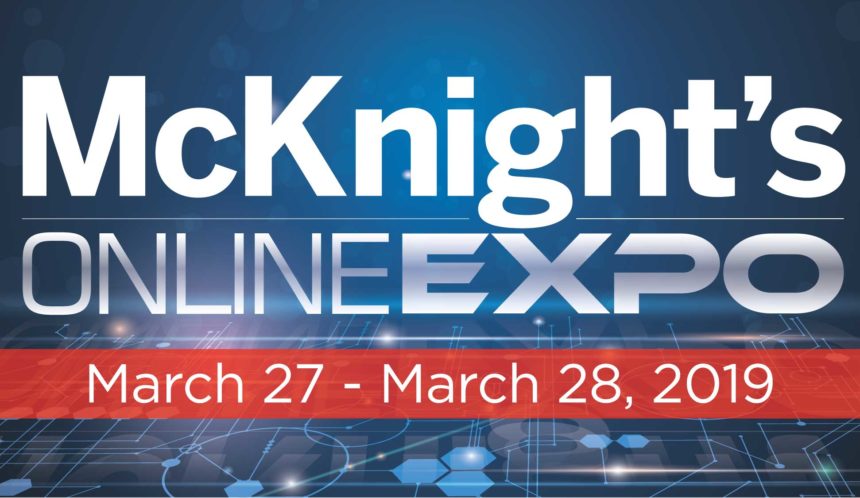
New Year’s resolutions may have worn off by now, but the opportunity to better yourself professionally will never be greater than at the end of this month, thanks to the McKnight’s Online Expo.
The 13th annual virtual trade show offers webinars conducted by leading national experts, continuing education credits, an exhibition hall with giveaways, contests, white papers and more. All for free.
The dates to circle are March 27 and 28. Attendees can stay wherever they want to be. All that is needed is an internet connection.
“Attendees [in the past] have been very gracious with their praise,” noted McKnight’s Editorial Director John O’Connor. “They’re going to be in for a real treat again this year. Providers cannot operate without knowing about our first-session’s payment and regulatory updates, as well as the information found in the other webinars.”
Day 1
Annual favorite Leah Klusch kicks off the first educational session at 11 a.m. Eastern Time on March 27, one half hour after the exhibit hall initially opens.
Throughout the two-day event, visitors may attend sessions, browse booths and “converse” with booth representatives in real time, or pop into the visitors’ lounge to make new friends or reconnect with old ones.
Klusch will present “Operational strategies for surviving the regulatory, payment and other changes ahead.” Topics will include preparing for shifts in the payment and documentation process.
The session also will delve into how data that a facility is transmitting will impact quality measures and performance metrics.
“We’ll discuss what data we can utilize now to identify facility services, demographics and the accuracy of a facility’s database,” Klusch added.
The Quality Track session will come next and start at 1 p.m. ET. Jill A. Schumann, president and CEO of LeadingAge Maryland, will deliver “Understanding the practical implications of trauma-informed care.”
The Centers for Medicare & Medicaid Services is asking for policies that are “culturally competent and trauma-informed” by Nov. 28, 2019. Given all of the other requirements for Phase 3, there may be a tendency to view this information purely from a compliance perspective, Schumann warned.
“In addition to identifying mental health resources when needed, creating environments that are sensitive to, and respectful of, trauma-related issues goes a long way toward creating safety for staff and residents,” she said. “We don’t necessarily need to know much about the trauma to guess when people aren’t feeling safe.”
The final session of the day, “Mobile tech: Friend or foe in the LTC workplace,” will start at 3 p.m. Attorney Kimberly Gordy, an associate with BakerHostetler, will offer valuable updates, and accompanying warnings, about digital safety.
“This session will educate about the ‘3 B’s’ of using mobile technology in long-term care: Basic Capabilities, Business Associates, and Bombshells,” Gordy said, adding that she’ll include a few helpful “words of warning.”
She’ll also give a candid assessment of how to handle apps and mobile-device safety that will apply to all listeners. “Because mobile apps are constantly evolving, this session will open with an overview on key terms to understand when evaluating an app, including the platform, the security, and the popular features in long-term care,” she explained.
“We will also identify key risk areas, or bombshells, that are associated with mobile technology use. From app providers masquerading as HIPAA compliant to the potential pitfalls of sharing information with families through an app, we will discuss how to protect your community in the mobile world.”
Day 2
Webinars will resume at 11:30 a.m. ET on March 28 with a sensitive wound-care presentation by Kevin R. Emmons, DrNP, of the Rutgers School of Nursing-Camden, clinical associate professor and WOCNEP Faculty Advanced Practice Nurse. The session, “Understanding wounds at end-of-life: We all have skin in the game,” is designed to appeal to clinicians and non-clinicians alike. Topics will include how each organ system impacts the skin, particularly at end-of-life, when a person may experience multiple organ dysfunction.
“Often, healthcare providers, management, clients and families have differing ideas about the development of wounds, degeneration and realistic expectations,” Emmons noted. “We will identify ways to improve understanding between all members of the healthcare team, including clients and family members regarding wounds at end of life.”
The Expo’s final session will be led by Beth Burnham Mace, chief economist for the National Investment Center for Seniors Housing & Care, at 1 p.m. ET. She’ll highlight trends in seniors housing market fundamentals, supply and demand and rent growth. Mace also will discuss some challenges facing the sector such as tight labor markets and labor shortages.
“Recent data shows that labor expenses, as measured by hourly wages, are growing at a faster pace than rents, suggesting [net operating income] pressure for many operators in the year ahead,” Mace noted.
“In addition to labor market considerations and market fundamentals, four other significant factors are influencing the industry today. These include healthcare payment and delivery disruption; demographics and the longevity revolution; technology; and the economy.”
From the March 1, 2019 Issue of McKnight's Long-Term Care News




